Tuesdays
Frederick Wiseman: An Institution
Programmed by Ben and Kat Sachs
Essay by Ben and Kat Sachs
“My films are about institutions, the place is the star. I have no precise definition of ‘institution’ other than a place that has existed for a while and that has fairly circumscribed geographical boundaries and where the staff is thought to be trying to do a good job. The institution serves the same purpose for me that the lines and net do for a tennis match: it provides boundaries. What takes place inside the boundaries is fit for inclusion in the film. Outside is another film.”
In the same essay in which these lines appear (“A Sketch of a Life,” written in 2010 for a monograph accompanying a MoMA retrospective), Frederick Wiseman writes that he’s never spent much time researching an institution before filming it. Curiosity has always been his motivating force, and his greatness as a filmmaker stems from his ability to inspire curiosity in viewers. An avid reader since his college years, Wiseman claims to structure his documentaries like novels; however, the structure of a Wiseman film is never immediately obvious. The director—who’s also produced and edited each of his 40 documentary features—routinely starts his films by plunging us into the institution at hand. From there, he accumulates scenes of daily life, approaching the subject from numerous perspectives until a bigger picture emerges.
Like Robert Bresson or Andy Warhol, Wiseman challenges viewers to look and listen harder. His films are famously devoid of identifying titles, on-camera interviews, and nondiegetic music. In giving up these staples of documentary cinema, Wiseman achieves a profound sense of immediacy. His close-ups—which regard faces with studious, even painterly attention—are among the most powerful in cinema. And though Wiseman regularly condenses long interactions to five- or ten-minute scenes, he always preserves the flow of conversation between the individuals onscreen, transforming everyday speech into something like music. (His documentary Welfare was even adapted into an opera.) One becomes keenly aware of how specificities of region, vocation, and class influence the ways people talk and interact. Given the director’s close attention to setting, each Wiseman film also serves as a time capsule of the year in which it was made.
Wiseman’s institutional portraits are filled with moments of unexpected brutality, compassion, and humor. In fact, several films in this series—Canal Zone, The Store, and Aspen—might be described as comedies. There are always challenges that stand between human beings and the aspirations they hold for their institution. Sometimes those challenges reflect problems in the world at large, but they also can derive from ordinary human failings like pettiness and failure of imagination. (Sometimes the problem lies in the overly intricate nature of the institution itself, as Wiseman observes in Welfare.) The filmmaker’s epic body of work teaches us that the complexities of institutions are bound up with the complexities of individuals. This might explain why Wiseman never provides explicit answers about what his films mean. As he wrote in “A Sketch of a Life,” “I am not sure I understand the films, and I know I do not understand myself.”
2015-03-31 @ 7:00 PM
High School

(Frederick Wiseman, 1968) · Wiseman’s second feature—a pithy, scathing report on a large public high school in Philadelphia—remains among his most popular. The film’s subject isn’t education so much as indoctrination, detailing the means by which teachers and administrators get students to accept the status quo. Filmed in 1968, at the height of the Vietnam War, the film reminds us that following orders carried grave implications, particularly in the chilling final scene
runtime: 75 min format: 16mm
2015-04-07 @ 7:00 PM
Law & Order

(Frederick Wiseman, 1969) · Timely as ever, this look at law enforcement in Kansas City centers on issues of segregation and police brutality. The depictions of brutality remain shocking—both because of the violence and because of the casualness with which it is performed. Writing years later about the onscreen strangulation of a prostitute by an arresting officer, Wiseman explained that “it could be filmed because the police thought they were acting appropriately.”
runtime: 81 min format: 16mm
2015-04-14 @ 7:00 PM
Welfare
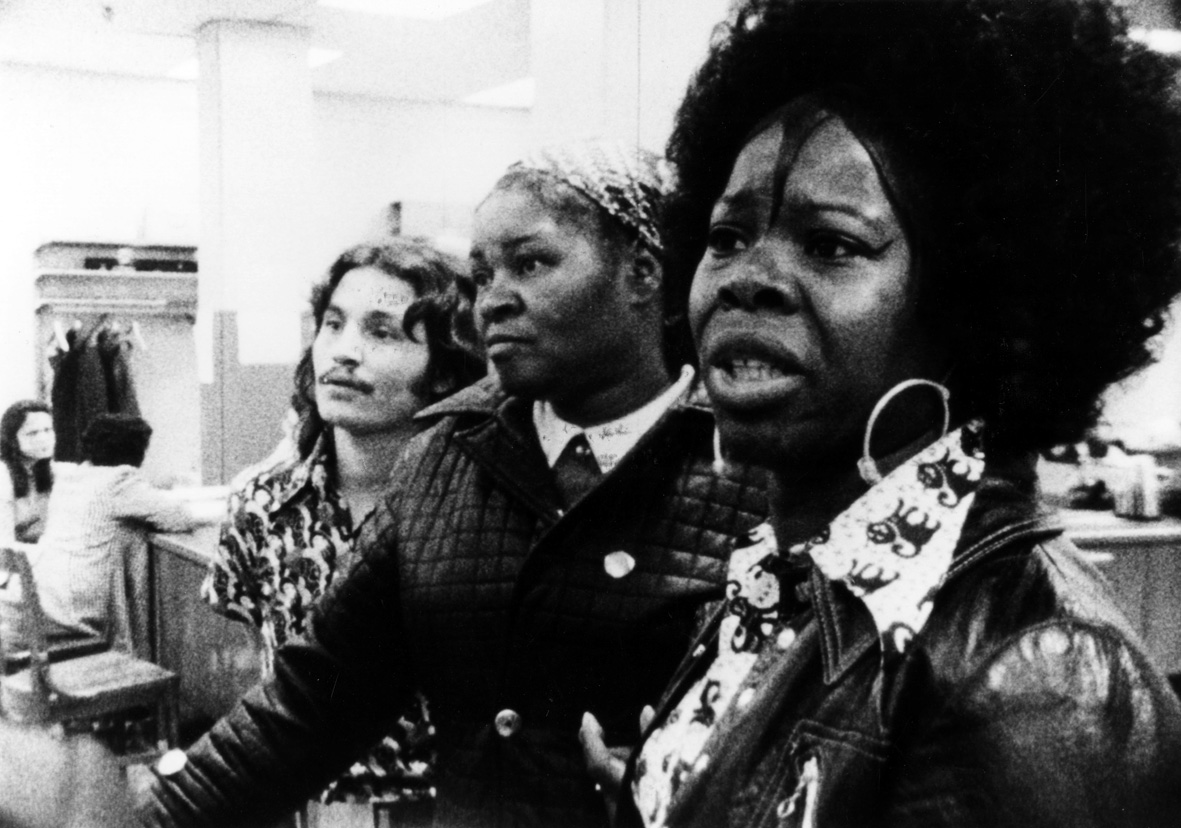
(Frederick Wiseman, 1975) · “It’s impossible to emerge from such an experience unscathed,” wrote Jonathan Rosenbaum of this nightmarish portrait of a New York City welfare office, shot during the dog days of America’s 1970s recession. It is both vast and claustrophobic; the camera never leaves the inside of the building, locking us in with the many people waiting, seemingly without end, for public aid. Appropriately, the climax contains a reference to Waiting for Godot.
runtime: 167 min format: 16mm
2015-04-21 @ 7:00 PM
Canal Zone
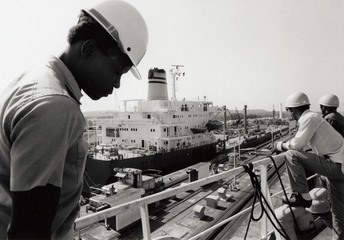
(Frederick Wiseman, 1977) · Visit the insular community of military men, government functionaries, and lower-middle-class workers in the Panama Canal Zone. Though the onscreen activity takes a backseat in this film, the people are brimming with personal and nationalistic pride. David Denby aptly described this as “a comic pathetic elegy for American imperialism.” It also functions as a far-reaching community portrait that anticipates Wiseman’s later masterpiece Belfast, Maine.
runtime: 174 min format: 16mm
2015-04-28 @ 7:00 PM
The Store
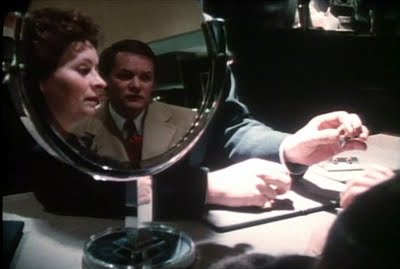
(Frederick Wiseman, 1983) · Wiseman’s first feature in color depicts the flagship location of the Nieman-Marcus department store and their corporate headquarters in Dallas. As in his more recent doc Crazy Horse, the primary theme is the manufacturing of desire—in this case, for a wide variety of consumer goods. Desire turns out to be a complicated business, involving the work of countless stock clerks, salespeople, managers, marketing executives, and, as always, janitors.
runtime: 118 min format: 16mm
2015-05-05 @ 7:00 PM
Blind

(Frederick Wiseman, 1986) · This film comes from Wiseman’s 1986 tetralogy about the education of people with disabilities, one of his most ambitious projects. Shot at the Alabama School for the Blind, it’s filled with scenes of quiet triumph, as children and adolescents make hard-earned strides towards self-sufficiency. The director doesn’t idealize his subjects, however, but he presents them as fully human, and numerous scenes display his antiestablishment humor.
runtime: 132 min format: 16mm
2015-05-12 @ 7:00 PM
Aspen
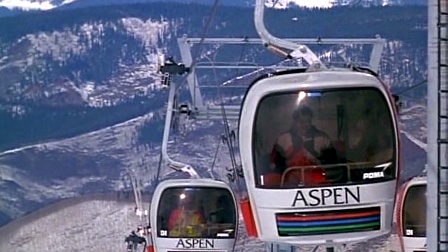
(Frederick Wiseman, 1991) · Wiseman here returns to the bitterly ironic mode of High School and Basic Training to observe America’s idle rich in the eponymous resort town. Epitomizing the shallowness and materialist excess of that era, Aspen is among the most damning films to be made about the Reagan-Bush years. Yet, Wiseman offsets the overall tartness with tender depictions of the city’s blue-collar population, oases of sincerity in a desert of soullessness.
runtime: 146 min format: 16mm
2015-05-19 @ 7:00 PM
Ballet
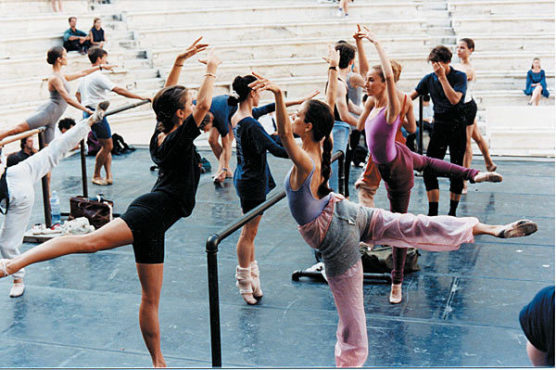
(Frederick Wiseman, 1995) · Before he documented the Paris Opera Ballet, Wiseman trained his camera on the American Ballet Theatre in New York. Like his 2009 La Danse, the film grants ample screen time to administrators as well as dancers and choreographers, presenting the company as a complex institution akin to a hospital or military base. Wiseman emphasizes the strenuous work—both physical and intellectual—of creating a ballet so we appreciate the results as much as he does.
runtime: 170 min format: 16mm
2015-05-26 @ 7:00 PM
Public Housing
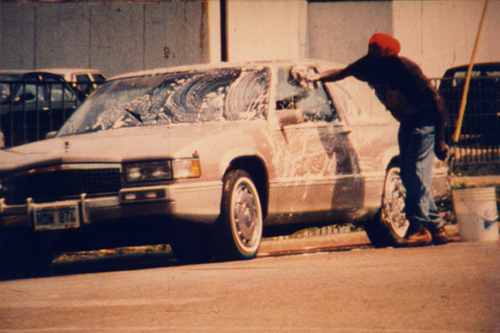
(Frederick Wiseman, 1997) · Chicago Reader’s J.R. Jones named this the best Chicago-shot documentary ever, and it’s easy to see why. Wiseman’s study of the now-defunct Ida B. Wells Homes is a monumental work that runs the gamut from tragedy to comedy (indeed the scene in the sex education class is one of the funniest in Wiseman’s filmography). Though filled with sobering images of urban poverty, it also spotlights everyday heroes trying to improve the world around them.
runtime: 195 min format: 16mm
2015-06-02 @ 7:00 PM
Domestic Violence
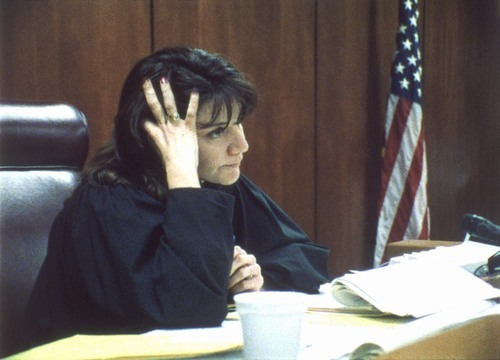
(Frederick Wiseman, 2001) · After a series of harrowing scenes of Tampa-area police responding to domestic violence calls, this overwhelmingly powerful film switches focus to a shelter where abused women and children struggle to rebuild their lives. Wiseman confronts both the worst and the best of humanity—the former represented by the clients’ recollections of abuse, the latter by the work of therapists and social workers, who help the clients to overcome their traumas.
runtime: 196 min format: 16mm



